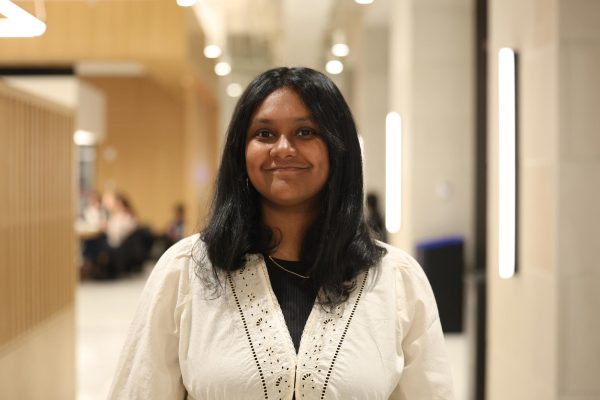Amrita Das, FCRH ’26, is a biochemistry major who is currently conducting pharmaceutical research against common diseases such as lung cancer and Alzheimer’s disease. Working in her lab in room 608 in John Mulcahy Hall, Das employs cutting edge technology in a collaborative environment with other students and her research mentor Dr. Ipsita Banerjee, the head of the chemistry and biochemistry departments.
Das discovered the lab at a research presentation she attended during her first-year. “The main thing that really got me interested in the lab was a research showcase spearheaded by the club MAPS [Minority Association of Pre-Health Students],” Das said. After seeing a presentation on the research currently being done on cancer cells with nanotechnology, she reached out to Banerjee and began working in the lab early last summer.
Currently, Das is working on a project assigned to her by Banerjee where she studies the effectiveness of a manufactured peptide-based compound on lung cancer cells. The compound, designed by Banerjee, was created to connect to the NMR protein on the lung cancer cell.
“What I’m working on right now is a lot of computational work,” Das said. “Dr. Banerjee makes the compounds, and we work with them to see how the drug binds with the cancer cell.”
Computational work involves docking studies, which observes how well the newly designed compound binds to the proteins on the cancer cell. In the lab, Das utilizes software such as AutoDock, Maestro and TURBOMOLE.
The lab uses technology that works at the nano-level, a recent development in the field. It offers promising advantages, particularly by limiting severe side effects of cancer treatments. “We’re using nanotechnology to target cancer cells. The whole purpose of this experiment is to prevent the side effects that come along with other chemotherapies… [the experiment] targets EGFR proteins without causing all those other side effects.”
Currently, Das is working on getting her results ready for publication, working with Hannah Hunt, FCRH ’24. Additionally, she is working with Emma Phan, FCRH ’26, on a second project researching Parkinson’s disease. “When certain proteins misfold, that can lead to an amyloid structure which is… linked to neurodegenerative diseases, like Alzheimer’s and Parkinson’s.” Again, Das will work with a team to test the effectiveness of certain drugs in breaking down the amyloid structures.
The lab, as Das explains, is inherently collaborative. “When you want to work in the lab, it’s very important to be able to work with others… The main way Dr. Banerjee’s lab works is that the juniors and seniors train you — they teach the sophomores and the [first-years] how to do the computational work, the wet lab procedures,” she explained. “It’s very important to be able to ask for help, but be open to helping others.”
Das’ experience in the lab has motivated her to pursue a major in biochemistry, which was recently announced at the end of last summer. “Once I joined the lab, I realized how useful biochemistry is, you can also use it in the field of medicine… Combining chemistry and biology together is how the human body works. I think it’s better to have a biochemical background applying to medical school.”















































































































































































































